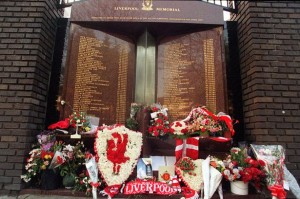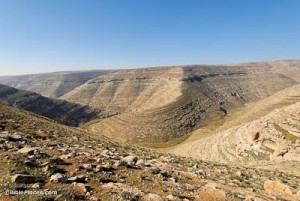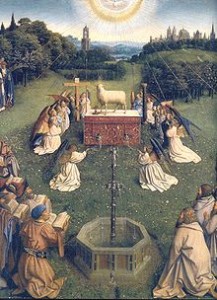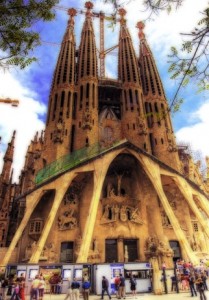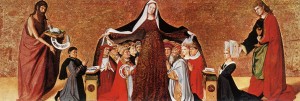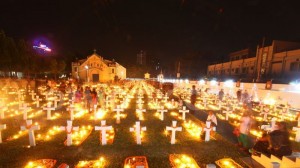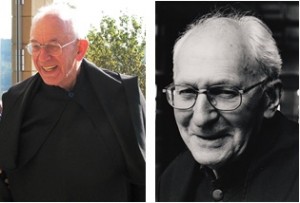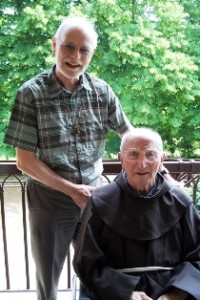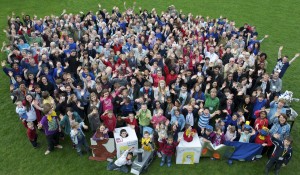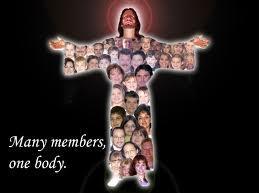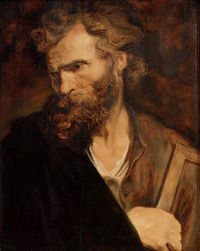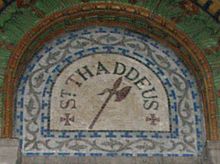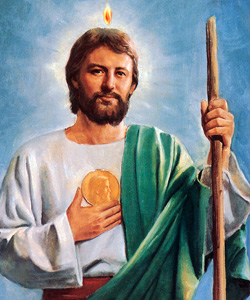LOVE CONNECTS ALL:
Posted by SociusJan 3
Just the other morning whilst enjoying my first cup of coffee, two thoughts came into my mind – and very important ones at that! The first was of a baby lying cradled in a manger. The second, was of a man, hanging on a cross. And, I was immediately drawn into considering the connection between the two. Of course, there is just one connection – LOVE.
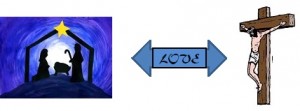 |
The way in which the Church organises its year can sometimes cause us confusion; I refer to the much fore-shortened time scale, of course. Already, this last week-end has seen the Child Jesus, born for us on Christmas Day, grow to a boy of 12 years of age, and there he is in the Temple, conversing with the Elders and asking them questions. They were amazed at his understanding. Also, we hear, that his mother, on finding him there after searching for three days, is told that he was attending to his Father’s affairs. In this, we have a foretaste – a prophecy – of his mission in life. In just three months time, we shall have moved on to Jesus at the age of (circa) 33 years, and the end of his mission, to his passion and death, then to his glorious resurrection, and, virtually, to the fulfillment of all that God the Father required of him.
But, to return to the main theme of this blog, LOVE, is the one thing that is driving all. It is the motive force behind God’s decision to send his beloved Son to earth, to become mortal, just like us, (whilst still retaining his divinity), and to be born of a young Jewish woman. It is God’s way of organising the supreme sacrifice that will reconcile, once again, God and humankind, after the sin of Adam and the sin of every man and woman who follow in Adam’s footsteps. Faith leads us to understand that this sacrifice of love – the incarnation leading to death on a cross – gives us hope for the future. That future no longer leads, inevitably, to eternal enmity with God – as it once did – but to the promise of eternal happiness with him in paradise.
We should never doubt God’s love for us – each and every individual – a promise that is true for all time. It behoves us to realise this, to accept it and to do our best to return that love with every fibre of our being.
There is another aspect to this love for God and here, Father Jonathan makes a very strong point with God’s second Commandment. In his words:
“The invitation we have to love God fully is also to love our neighbour, especially making a pact of mercy with anyone with whom we need to start again. We should forgive all that others might “owe” us, for example an apology or even something material like money or goods that they have belonging to us. This year if we make our relationships with all others better we will find that the love for God himself will grow. He will speak in our hearts and make us see what to do in regards to God. It is mercy that hopes all, covers all, trusts and believes all, and if that is what we do in response to God’s immense love for us, then we will have done something really worthwhile for his Kingdom, and it could spread to others and become something that grows very widely.”
If only this could be so in our world today, what a change there would be to life as we know it.
Socius
Post-Script: Readers will know that, in past issues, attention has often been drawn to the thoughts and writings of Manfred, who has a terminal brain tumour. The following – again touching on LOVE – was written by him on the final day of 2012. (He refers to ‘LOVE’ as a nice voice because it overcomes all negatives for Manfred. For instance the fears he may have about his incurable brain tumour, and when it will strike which so preoccupies him that he has failed to love his neighbour in the house where he lives. Also his mistakes, sins, lack of love in the past year or even that morning. When he loves again and is in communion with others, then “the returning to live in communion with the others the subtle voice of love inside is amplified through the love of the others.”):
“What a nice voice which is so clear and brings peace. But the most amazing thing is that even in (that) apparent failure there is God’s love! Because Jesus died on the Cross he transformed pain and suffering into love. Where I see suffering and joy God sees love in both. I can begin again now in this present moment and every moment because God never ceases to love me. What a wonderful gift to receive, because it means that all those moments of pain and suffering in the past year I can fill with one act of love making a parcel of all those things and give them as a gift to Jesus on the Cross. My year becomes his and it is a year full of the God’s love for us. Today I dedicate to giving all my past year to Jesus on the Cross as a gift of love.”
Wishing you all a very Happy New Year, with every blessing for 2013.


